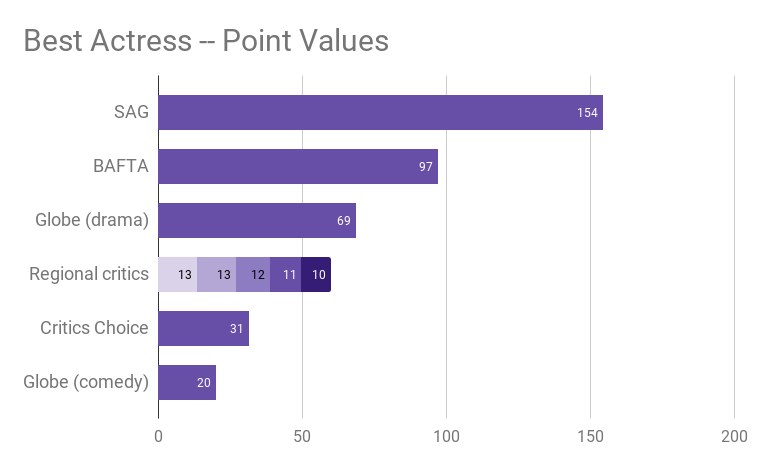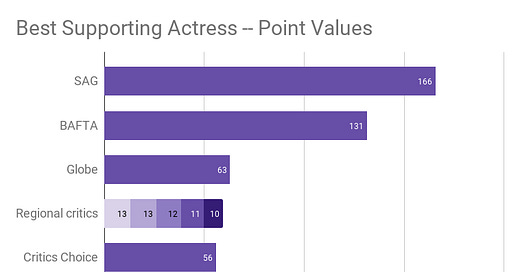Numlock Awards: Actors Model Preview
The Numlock Awards Supplement is your one-stop awards season update. You’ll get two editions per week, one from Not Her Again’s Michael Domanico breaking down an individual Oscar contender or campaigner and taking you behind the storylines, and the other from Walt Hickey looking at the numerical analysis of the Oscars and the quest to predict them. Look for it in your inbox on Saturday and Sunday. Today’s edition comes from Walter.
I’m gradually rolling out the new models. The acting model is a little less complicated than the Best Picture model, so it’s time for our pre-Nomination Awards Season Gut Check.
The acting model sees the fewest tweaks. It’s not worth overdoing the re-weighting by Guilds when there’s just SAG and BAFTA. There’s two major shifts:
Relegation-style critic awards, where rather than counting the same awards every year we look at the best performing regional prizes and only count them.
Scores that value recent predictive power over historic predicitve power.
Before we dive into the season, I wanted to put out the weights for the prizes to come. The score is determined by looking at the past 20 years of awards.
There are five things that inform our understanding of the acting awards:
Screen Actors Guild awards (SAG)
British Academy awards (BAFTA)
Golden Globes
Critics’ Choice award
The outcomes of the five most reliable local critics’ groups in a category. These are grouped into a single value. The total weight of that value is just the average of the Critics’ Choice and Golden Globe.
The weighting determination goes like this:
Look at the past 20 years to see when the precursor award winner also went on to win the Oscar. They get:
1 point for successful calls in the 20th through 11th year
2 points for successful calls in the 10th through 6th year
3 points for successful calls in the past 5 years
Divide that number by 35.
You have a number between 0 and 1. Square that number, and then multiply it by 100.
Double it for SAG and BAFTA as their membership coincides with Oscar voters.
To deal with the local critics, their combined value is tied to the average of the scores of the Globes and Critics’ Choice. That’s divvied up among the local critic prizes based on how reliable they are compared to one another. Basically, though, they’re all worth about a fifth of that total. We don’t really care about what they mean individually, just if they speak to a larger more significant trend. So if the five critics’ groups all go for different performances, they won’t have a big impact on the model. That’s the case for Best Actress this year. But if the critics are voting in unison, a performer can get a solid bump, like in Supporting Actress this year.
The way to think about it is that a performer running the table on critics’ awards is meaningful, but any individual award doesn’t really matter all that much. That’s why I scrubbed out big city and idiosyncratic critic awards (NY, LA, Chicago) and added this combined score in.
Best Supporting Actress
Main takeaway: The Screen Actors Guild and BAFTA are responsible for the vast majority of the points, by a long shot.

Most reliable local critics’ awards: Iowa (7 successful Supporting Actress predictions for the past 14 years), Austin (5 for 12), St. Louis (8 for 14), Washington (9 for 16), New York Online (9 for 17).
Notes: Regina King’s won all 5 of the local critics’ groups, the Golden Globe and the Critics’ Choice awards. Her issue will be that she’s maxed out her possible score, as she’s not up at BAFTA or SAG. A split decision there is her best bet to remain in the game, but if the actors and Brits break in the same direction she’s got issues.
Best Supporting Actor
Main takeaway: The predictive awards here are more varied, and the Golden Globe factors in more heavily

Most reliable local critics’ awards: St. Louis (8 for 14), Dallas-Ft. Worth (10 for 20), Washington (8.5 for 16), Austin (7.5 for 15), North Texas (8 for 12).
Notes: The local critics were split between Richard E. Grant (St. Louis and Austin) and Mahershala Ali (D.C., North Texas and St. Louis), and Ali won both the Critics’ Choice and Globe. Were he to pull in SAG or BAFTA, he’s a solid frontrunner on Oscar night.
Best Actor
Biggest prizes: SAG is the coronation.

Most reliable local critics’ awards: Las Vegas (7 for 15), Washington (8 for 16), New York Online (10 for 17), Dallas-Ft. Worth (11 for 20), St. Louis (9 for 14).
Notes: Quite competitive. Incidentally Ethan Hawke (Vegas, New York Online and St. Louis) has the critic’s edge over Bradley Cooper (DC) and Christian Bale (Dallas), but his ride is likely closing with snubs at BAFTA and SAG. Rami Malek took the Globe for Drama and Christian Bale took the pointless award for comedy. Bale’s got an edge with the win at Critics’ Choice, but this is really BAFTA’s and SAG’s to decide for us.
Best Actress
Biggest prizes: SAG is the real prize. The Golden Globe is far more predictive than the Critics’ Choice Award, but this year the critics’ choice wasn’t doing much for us anyway.

Most reliable local critics’ awards: Austin (4 for 12), New York Online (6 for 17), Las Vegas (6.5 for 15), St. Louis (6 for 14), Southeastern (8 for 20).
Notes: The locals are completely fractured, with Olivia Colman taking 2 and Melissa McCarthy, Lady Gaga and Toni Colette also winning stuff. This is the oddball category where the comedic Globe matters, so Olivia Coleman and Glenn Close (who won for Drama) get the boost, and the Critics’ Choice tie between Gaga and Close complicates it further. This is, without question, the single most interesting race of the year.
COMING TUESDAY: Full predictions!

